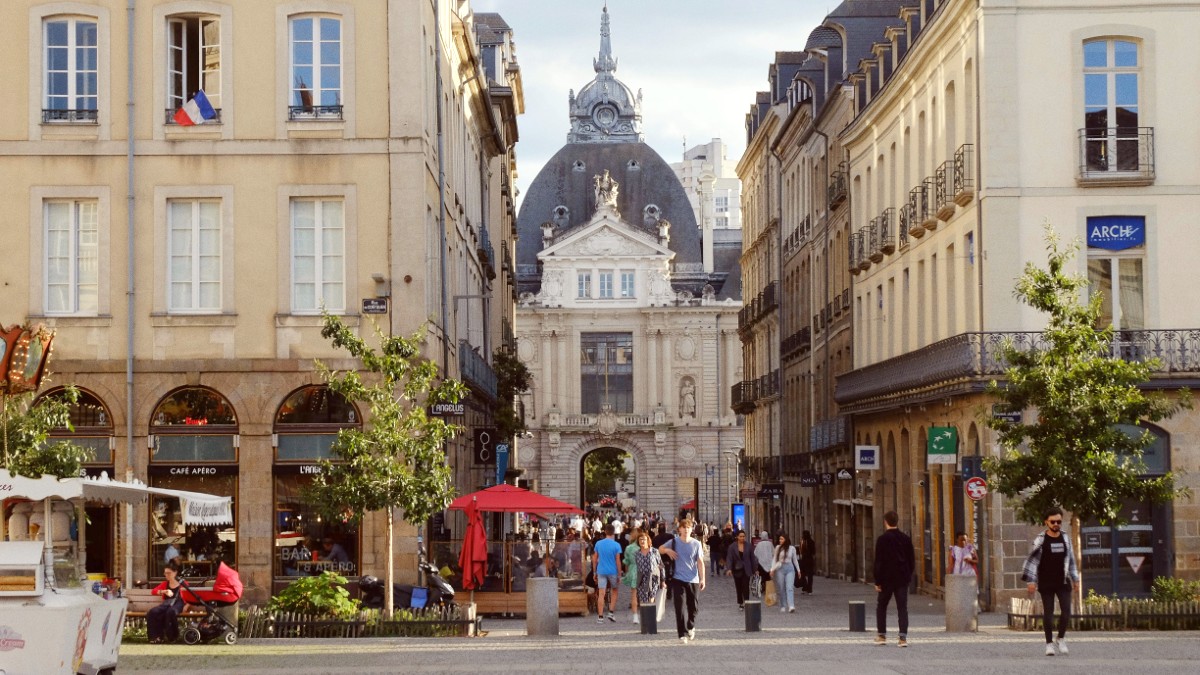
France
Spring (April-May) presents temperatures from 8°C (46°F) to 17°C (63°F). Expect moderate rainfall. This season brings blooming flowers, making parks and gardens notably attractive. Days grow longer, giving more daylight hours for exploration. Summer (June-August) brings the warmest months, with average temperatures from 14°C (57°F) to 23°C (73°F). Summer gives occasional heavy rain showers. Autumn (September-October) brings temperatures from 10°C (50°F) to 18°C (64°F). Rainfall increases compared to summer. Winter (November-March) presents the coldest months, with average temperatures between 3°C (37°F) and 10°C (50°F). Precipitation is higher, mainly rain.
Rennes does not experience monsoons or hurricanes. However, winter brings strong winds and persistent drizzle, making waterproof outerwear a necessity. While rare, extreme temperatures, either very hot summers or very cold winters, occur. Always check the forecast closer to your travel dates.
Budget travelers discover the best value in winter (November-March), with cheaper flights and accommodation, along with fewer crowds. Sightseeing and walking find their most comfortable temperatures in Spring (April-May) and early Autumn (September).
Stay Hydrated
Drink plenty of water, seek shade during hot parts of the day.
Prolonged sun exposure during midday heat.
Pack Waterproofs
Bring a sturdy umbrella and waterproof jacket.
Wearing non-waterproof shoes for extensive walking.
Layer Up
Dress in warm layers, including hat, scarf, and gloves.
Light clothing, especially for evenings and damp days.
France is part of the Schengen Area, a group of 27 European countries that abolished passport and all other types of border control at their mutual borders. Visa requirements for entering France depend on your nationality. Plan this part of your trip carefully to avoid issues upon arrival.
Citizens of non-Schengen countries without visa-free agreements require a Schengen Visa (Short-stay), allowing stays up to 90 days within any 180-day period. Apply for this visa at the French consulate or embassy in your country of residence. Processing takes 15 to 45 days. For stays over 90 days, a long-stay visa becomes necessary. Consult the French embassy for details.
Valid for 3 months beyond departure, issued within 10 years, 2 blank pages.
Affixed in passport before travel.
Hotel reservations or invitation letter.
Bank statements or sponsor's letter for expenses.
Proof of departure from Schengen Area.
While generally more affordable than Paris, Rennes maintains higher costs than smaller French towns. Your daily budget will vary with your travel style.
The currency used in Rennes, and throughout France, is the Euro (€).
Tipping is not obligatory in France. Service (service compris) is included in the bill by law at restaurants and cafes. However, a small tip for truly exceptional service is appreciated.
These are approximate costs and can fluctuate based on season, demand, and specific choices.
France maintains a high standard of healthcare. Rennes itself is generally a safe city for visitors. However, as with any travel, prepare for potential health concerns and understand safety practices.
While tap water in Rennes is safe to drink, some travelers prefer Bottled water. Be mindful of food hygiene in smaller, less established eateries. Wash your hands frequently. Use Sunscreen SPF 50 during summer, even on cloudy days. Wear a hat and Sunglasses.
Pollen counts run high in spring and summer, so bring usual allergy medication if needed. Mosquitoes appear in warmer months, especially near water. Use Insect Repellent with DEET.
112 is the European emergency number, working for all services (ambulance, police, fire brigade).
15: SAMU (medical emergencies).
17: Police; 18: Firefighters (Pompiers, also medical emergencies).
Rennes is generally a safe city. Petty crime like pickpocketing happens in crowded tourist areas (train station, city center during market, public transport).
Be vigilant with belongings; keep valuables out of sight. Use a Money belt.
Avoid walking alone in poorly lit areas late at night.
Rennes faces a low risk of major natural disasters. Heavy rainfall sometimes causes minor localized flooding along the Vilaine River.
Minor flood risks during heavy rain, but minimal to visitors.
Heatwaves happen in summer. Stay hydrated and seek shade.
| Coverage Area | Benefit | Recommendation |
|---|---|---|
| Medical Emergencies | Hospitalization & treatment. | Comprehensive coverage. |
| Trip Interruption | Cancellation or early return. | Protect against unforeseen events. |
| Lost Luggage | Reimbursement for stolen/lost items. | Good for peace of mind. |
Image: [https://upload.wikimedia.org/wikipedia/commons/thumb/c/c1/Rennes_-_Place_de_la_Mairie_et_Op%C3%A9ra_de_Rennes.jpg/1280px-Rennes_-_Place_de_la_Mairie_et_Op%C3%A9ra_de_Rennes.jpg](https://upload.wikimedia.org/wikipedia/commons/thumb/c/c1/Rennes_-_Place_de_la_Mairie_et_Op%C3%A9ra_de_Rennes.jpg/1280px-Rennes_-_Place_de_la_Mairie_et_Op%C3%A9ra_de_Rennes.jpg) Caption: Rennes City Hall and Opera House, demonstrating the city's elegant architecture.
Blend of medieval timber-framed houses and classical stone buildings.
Numerous parks, like Parc du Thabor, and riverside walks along the Vilaine.
Bustling markets, lively squares, and energetic student life.
The city’s architecture tells a story of resilience and rebirth.
The images of Rennes reveal its dual nature: the charm of its old city, with its characteristic timber-framed houses, and the grandeur of its classical facades from the reconstruction after the 1720 fire.
These visuals invite discovery, demonstrating a city that gracefully blends its deep historical roots with a dynamic, modern presence. Every corner presents a picturesque scene, from the bustling Place des Lices to the elegant Opera House.
The consistent theme of teal, blue, and green throughout the visual guide reflects Rennes’s yet harmonious atmosphere.
Historic market square with iconic timber-framed houses, bustling especially on Saturdays.
Elegant structures showing the city's classical architectural style.
A grand 17th-century building, central to Rennes's judicial history.
Rennes rarely suffers from extreme weather, but be aware of how light and conditions influence your photographs.
The city's strong connection to art and culture also shapes its visual identity. The Musée des Beaux-Arts presents centuries of artistic development.
A major art museum with diverse collections.
A hub for performing arts and cultural events.
A modern complex with a library, museum, and science center.